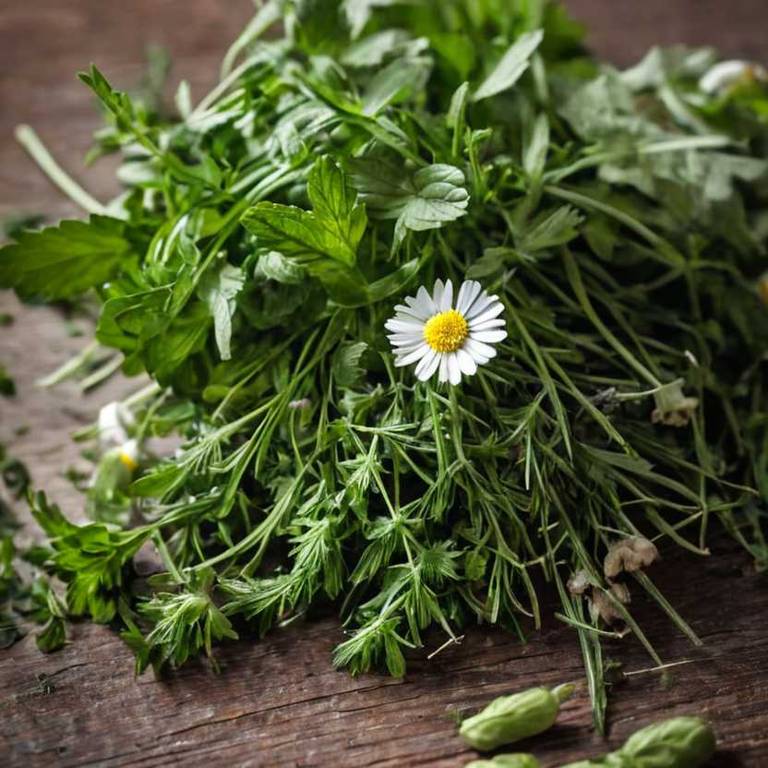English Daisy (Bellis perennis)
English Daisy (Bellis perennis) is a member of the Asteraceae family, native to Europe, Western Asia, and North Africa. Traditionally, its leaves, flowers, and roots have been used for infusions, decoctions, and poultices.
This herb is particularly valued for its anti-inflammatory, diuretic, and carminative actions, and has a long history of use in european herbal medicine, mediterranean herbal traditions, and traditional chinese medicine.

Quick Facts / Key Information
| Common Name | English Daisy |
|---|---|
| Scientific Name | Bellis perennis |
| Plant Family | Asteraceae |
| Genus | Bellis |
| Species | perennis |
| Native Range | Europe, Western Asia, North Africa |
| Plant Parts Used | Leaves, Flowers, Roots |
| Primary Medicinal Actions | Anti-Inflammatory, Diuretic, Carminative |
| Primary Traditional Systems | European Herbal Medicine, Mediterranean Herbal Traditions, Traditional Chinese Medicine |
| Historical Preparation Methods | Infusion, Decoction, Poultice |
Botanical Identity
- Scientific Name
- Bellis perennis
- Common Name
- English Daisy
- Synonyms / Alternative Names
- Common Daisy, Shinleaf, Pennywort
- Plant Family
- Asteraceae
- Genus
- Bellis
Botanical Description
- Growth Habit
- Perennial herbaceous plant.
- Height
- It typically grows to a height of 10 to 30 centimeters.
- Leaves
- Broad leaves with upper surface glabrous and green, lower surface glabrous and lighter green, bearing stomatal bands.
- Flowers
- Inflorescences are composite heads with white ray florets and yellow disk florets arranged in a single, flat, circular pattern, with actinomorphic symmetry and 10-12 reflexed, ovate, white ray flowers.
- Stems
- Cylindrical, terete, herbaceous stems with opposite branching, glabrous surface, and persistent leaf scars.
Traditional Uses / Historical Use
Traditional Systems
- European Herbal Medicine
- Mediterranean Herbal Traditions
Historical Preparation Methods
- Infusion
- Decoction
- Poultice
- Oil Infusion
Medicinal Actions
- Anti-inflammatory
- As described in traditional systems, a gentle anti-inflammatory, for general calming applications.
- Diuretic
- Commonly referenced as a warming diuretic, in fluid-regulation contexts.
- Carminative
- Traditionally described as a moderate carminative, in relation to gastrointestinal comfort.
- Astringent
- In herbal literature, noted as a mild astringent, in structural-support contexts.
Active Compounds
- Flavonoid
- A widely occurring class of plant polyphenols found in leaves, flowers, and fruits.
- Coumarin
- Plant-derived compounds often associated with fragrance-related chemistry.
- Phenolic Acid
- Simple phenolic molecules widely distributed across plant tissues.
- Tannin
- A group of compounds frequently present in plant tissues exposed to herbivory.
Modern Research Overview
Modern scientific investigation of this plant has focused on identifying its chemical constituents and examining their properties in controlled research settings. Comprehensive study summaries will be incorporated into this section as additional sources are reviewed.
Safety & Contraindications
- General Precautions
- Caution is advised in certain contexts based on traditional use and available information.
- Contraindications
- Reports outlining specific contraindications for this herb are limited.
- Allergies
- Sensitivity or allergy-related effects have not been clearly established.
- Drug Interactions
- Interactions with prescription medications have not been well documented.
- Toxicity
- Toxic effects associated with this herb have not been well documented.
- Pregnancy & Breastfeeding
- Information addressing pregnancy and breastfeeding-related safety for this herb is limited.
Preparation & Usage Methods
- Infusion
- Plant material is steeped in hot water to extract water-soluble compounds.
- Decoction
- Plant material is simmered in water to extract compounds from tougher parts.
- Poultice
- This method uses direct contact between plant material and the skin.
- Tincture
- Tinctures are liquid extracts produced through alcoholic maceration.
- Infused Oil
- Oils are infused with plant material over time to absorb constituents.
Growing, Harvesting & Storage
Growing / Cultivation
- Soil
- Prefers loamy soil with well-drained conditions. Typically grows best in organically rich soils.
- Sunlight
- Thrives in partial sun. Tolerates full sun to partial shade.
- Watering
- Prefers well-balanced moisture levels. Tolerates periodic dry conditions.
Medical Disclaimer
The information provided on this page is for educational and informational purposes only. It is not intended to diagnose, treat, cure, or prevent any medical condition. Always consult a qualified healthcare professional before using any herb for medicinal purposes.